How Nurse Leaders Can Use IT to Improve Nursing Practices and Outcomes
VerifiedAdded on 2022/10/31
|12
|858
|143
Presentation
AI Summary
This presentation focuses on the crucial role of nurse leaders in utilizing information technology to enhance nursing practices and improve patient outcomes. It begins by highlighting the transformative impact of health information technology, particularly in the context of an aging population with multiple chronic illnesses. The presentation emphasizes how electronic health records (EHRs) can improve patient outcomes, such as reducing pressure ulcers and fall risks, and also discusses the importance of organizational factors like leadership, teamwork, and collaboration. The role of Gerontological nurses is highlighted. The presentation also examines the use of research and evidence-based practices, and communication technologies to support improved patient outcomes. The presentation aims to equip nurses with the knowledge and skills to effectively integrate IT into their practices to foster better patient care.
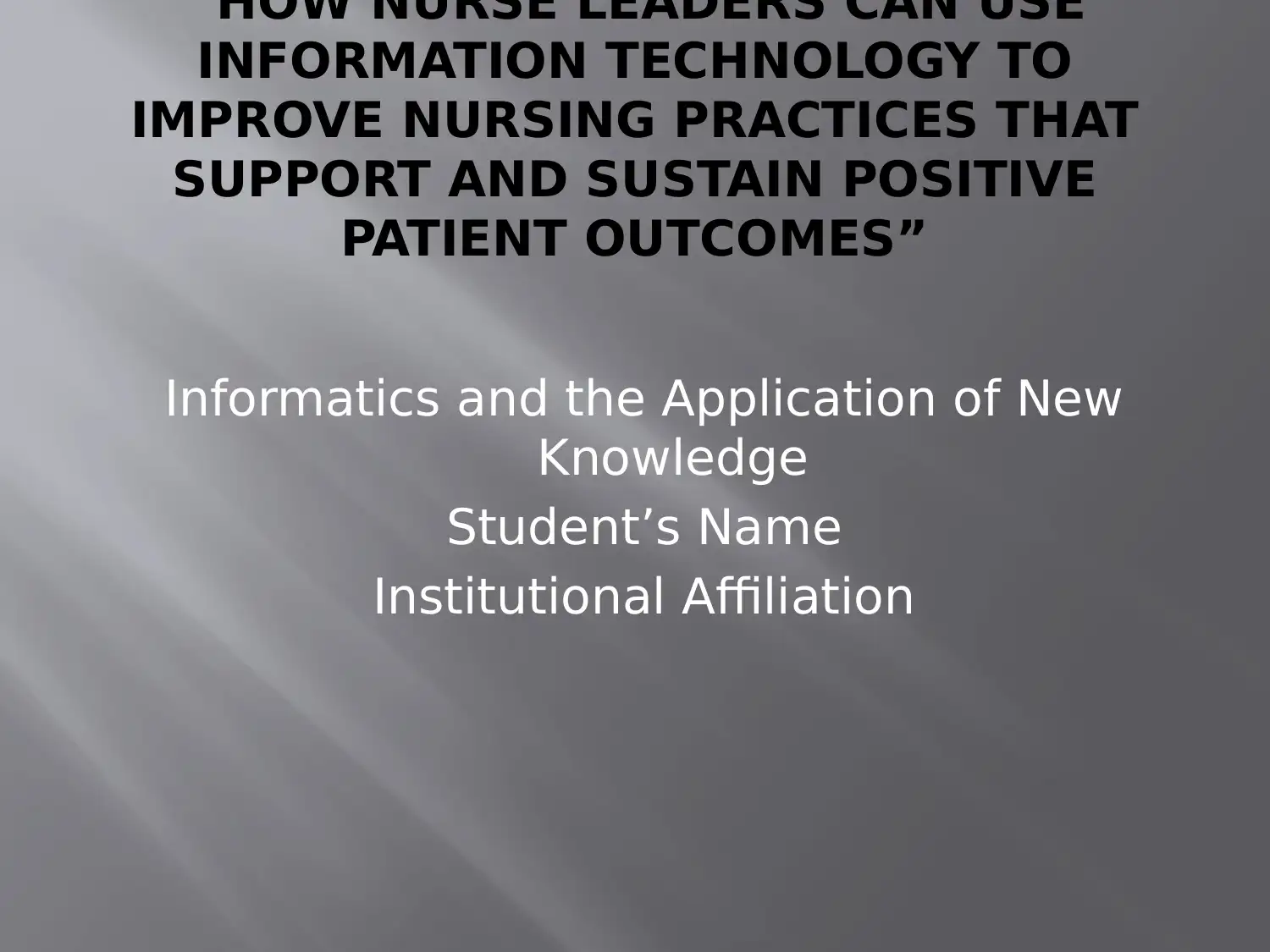
“HOW NURSE LEADERS CAN USE
INFORMATION TECHNOLOGY TO
IMPROVE NURSING PRACTICES THAT
SUPPORT AND SUSTAIN POSITIVE
PATIENT OUTCOMES”
Informatics and the Application of New
Knowledge
Student’s Name
Institutional Affiliation
INFORMATION TECHNOLOGY TO
IMPROVE NURSING PRACTICES THAT
SUPPORT AND SUSTAIN POSITIVE
PATIENT OUTCOMES”
Informatics and the Application of New
Knowledge
Student’s Name
Institutional Affiliation
Paraphrase This Document
Need a fresh take? Get an instant paraphrase of this document with our AI Paraphraser
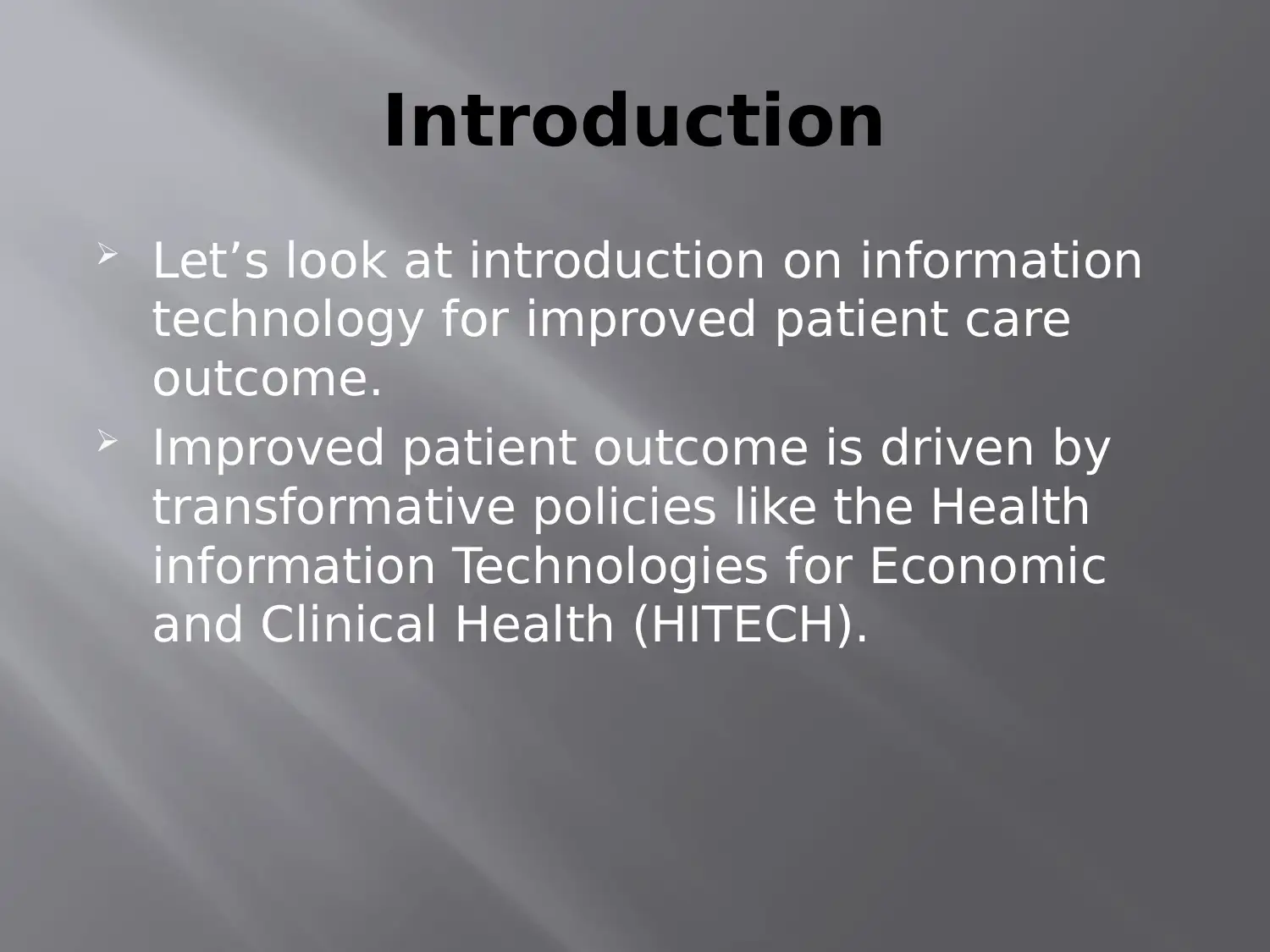
Introduction
Let’s look at introduction on information
technology for improved patient care
outcome.
Improved patient outcome is driven by
transformative policies like the Health
information Technologies for Economic
and Clinical Health (HITECH).
Let’s look at introduction on information
technology for improved patient care
outcome.
Improved patient outcome is driven by
transformative policies like the Health
information Technologies for Economic
and Clinical Health (HITECH).
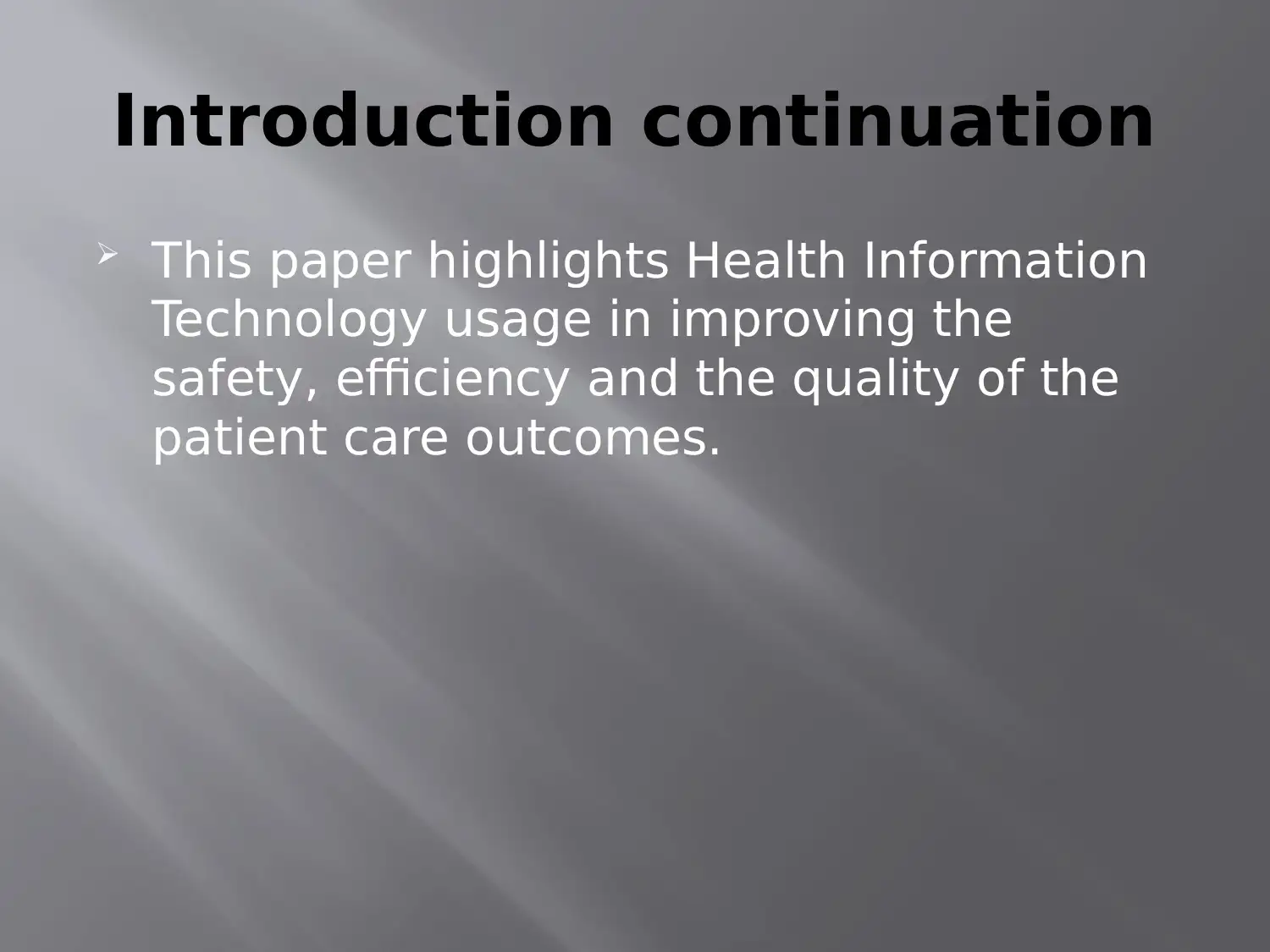
Introduction continuation
This paper highlights Health Information
Technology usage in improving the
safety, efficiency and the quality of the
patient care outcomes.
This paper highlights Health Information
Technology usage in improving the
safety, efficiency and the quality of the
patient care outcomes.
⊘ This is a preview!⊘
Do you want full access?
Subscribe today to unlock all pages.

Trusted by 1+ million students worldwide
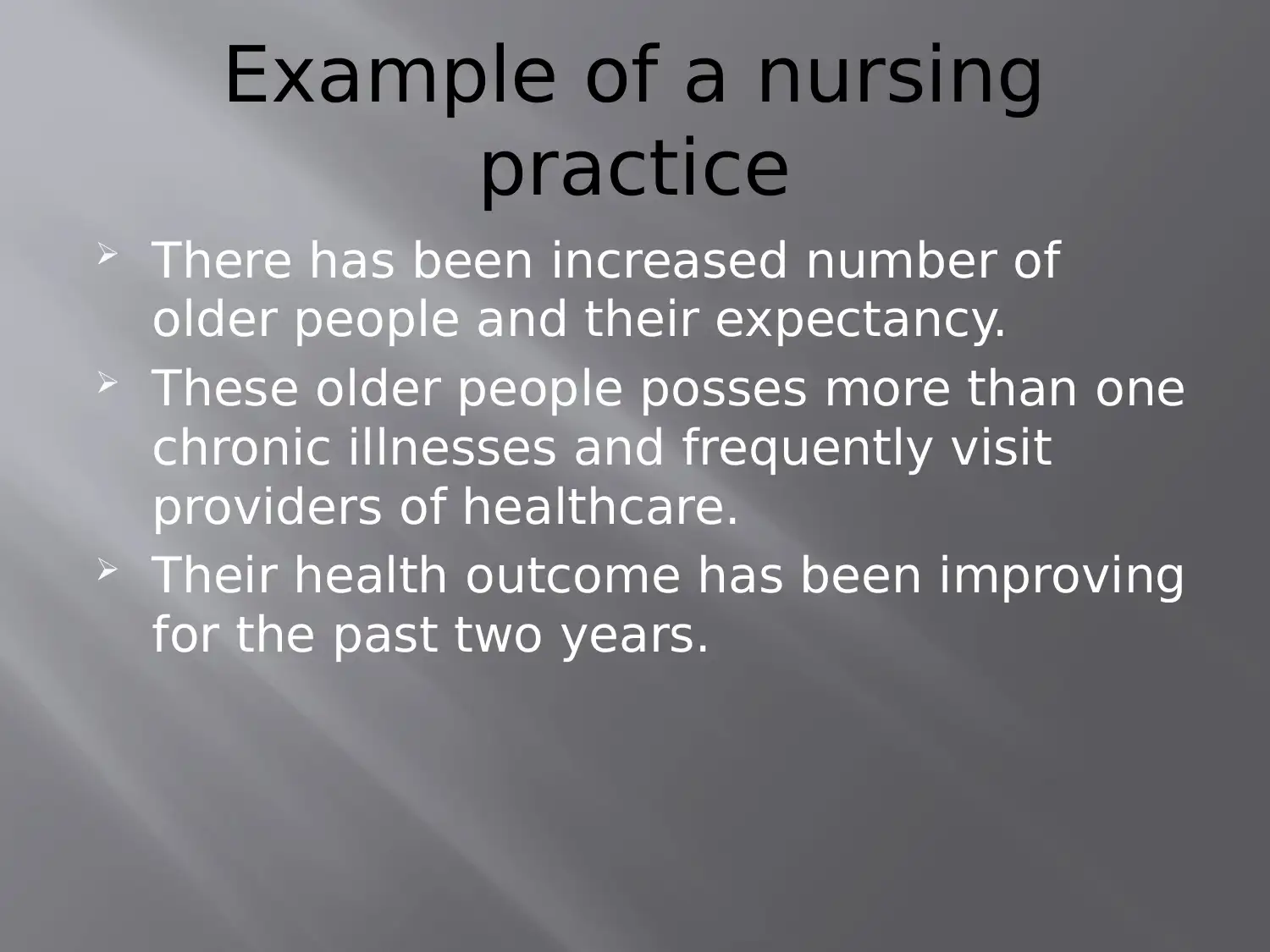
Example of a nursing
practice
There has been increased number of
older people and their expectancy.
These older people posses more than one
chronic illnesses and frequently visit
providers of healthcare.
Their health outcome has been improving
for the past two years.
practice
There has been increased number of
older people and their expectancy.
These older people posses more than one
chronic illnesses and frequently visit
providers of healthcare.
Their health outcome has been improving
for the past two years.
Paraphrase This Document
Need a fresh take? Get an instant paraphrase of this document with our AI Paraphraser
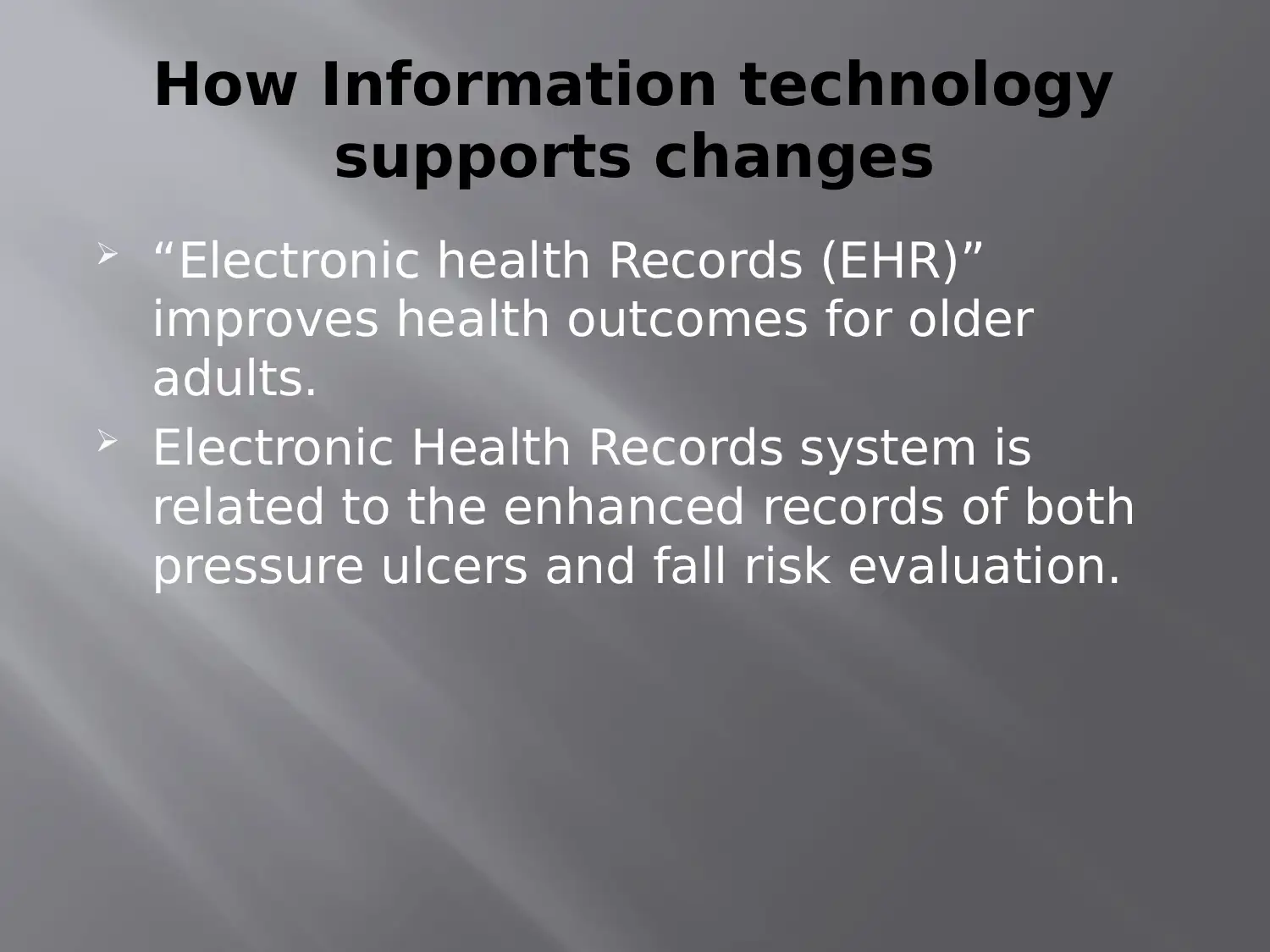
How Information technology
supports changes
“Electronic health Records (EHR)”
improves health outcomes for older
adults.
Electronic Health Records system is
related to the enhanced records of both
pressure ulcers and fall risk evaluation.
supports changes
“Electronic health Records (EHR)”
improves health outcomes for older
adults.
Electronic Health Records system is
related to the enhanced records of both
pressure ulcers and fall risk evaluation.
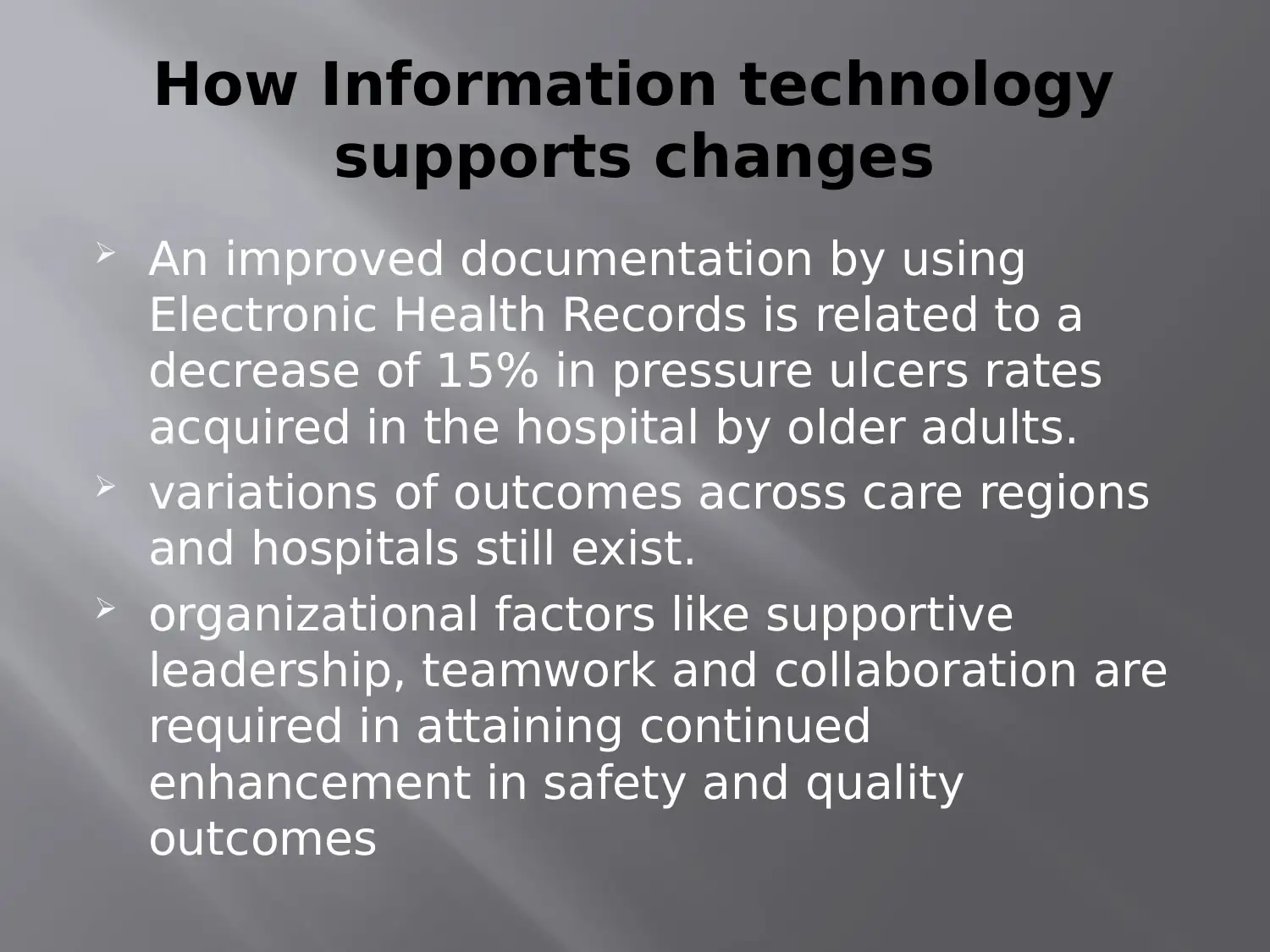
How Information technology
supports changes
An improved documentation by using
Electronic Health Records is related to a
decrease of 15% in pressure ulcers rates
acquired in the hospital by older adults.
variations of outcomes across care regions
and hospitals still exist.
organizational factors like supportive
leadership, teamwork and collaboration are
required in attaining continued
enhancement in safety and quality
outcomes
supports changes
An improved documentation by using
Electronic Health Records is related to a
decrease of 15% in pressure ulcers rates
acquired in the hospital by older adults.
variations of outcomes across care regions
and hospitals still exist.
organizational factors like supportive
leadership, teamwork and collaboration are
required in attaining continued
enhancement in safety and quality
outcomes
⊘ This is a preview!⊘
Do you want full access?
Subscribe today to unlock all pages.

Trusted by 1+ million students worldwide
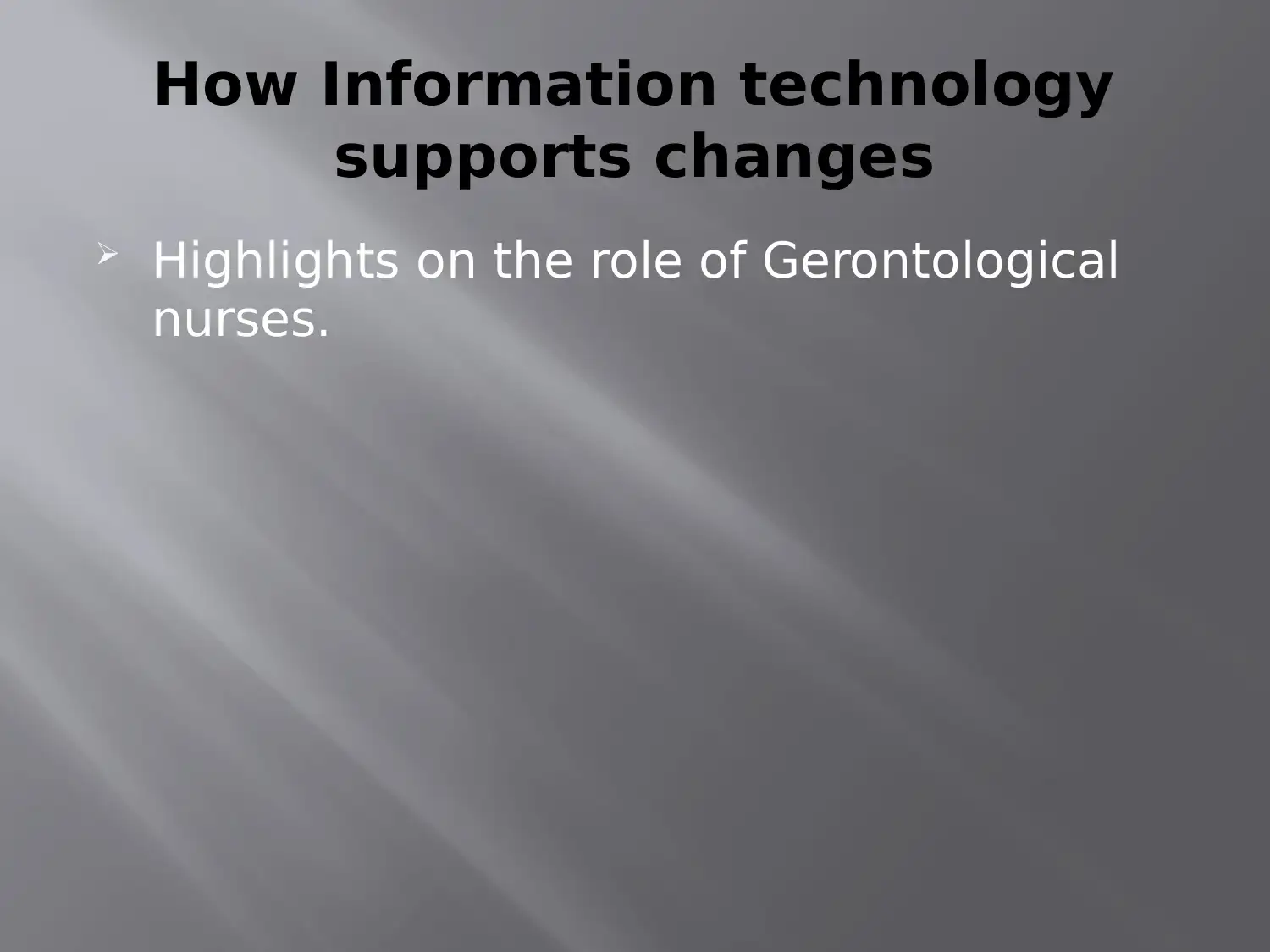
How Information technology
supports changes
Highlights on the role of Gerontological
nurses.
supports changes
Highlights on the role of Gerontological
nurses.
Paraphrase This Document
Need a fresh take? Get an instant paraphrase of this document with our AI Paraphraser
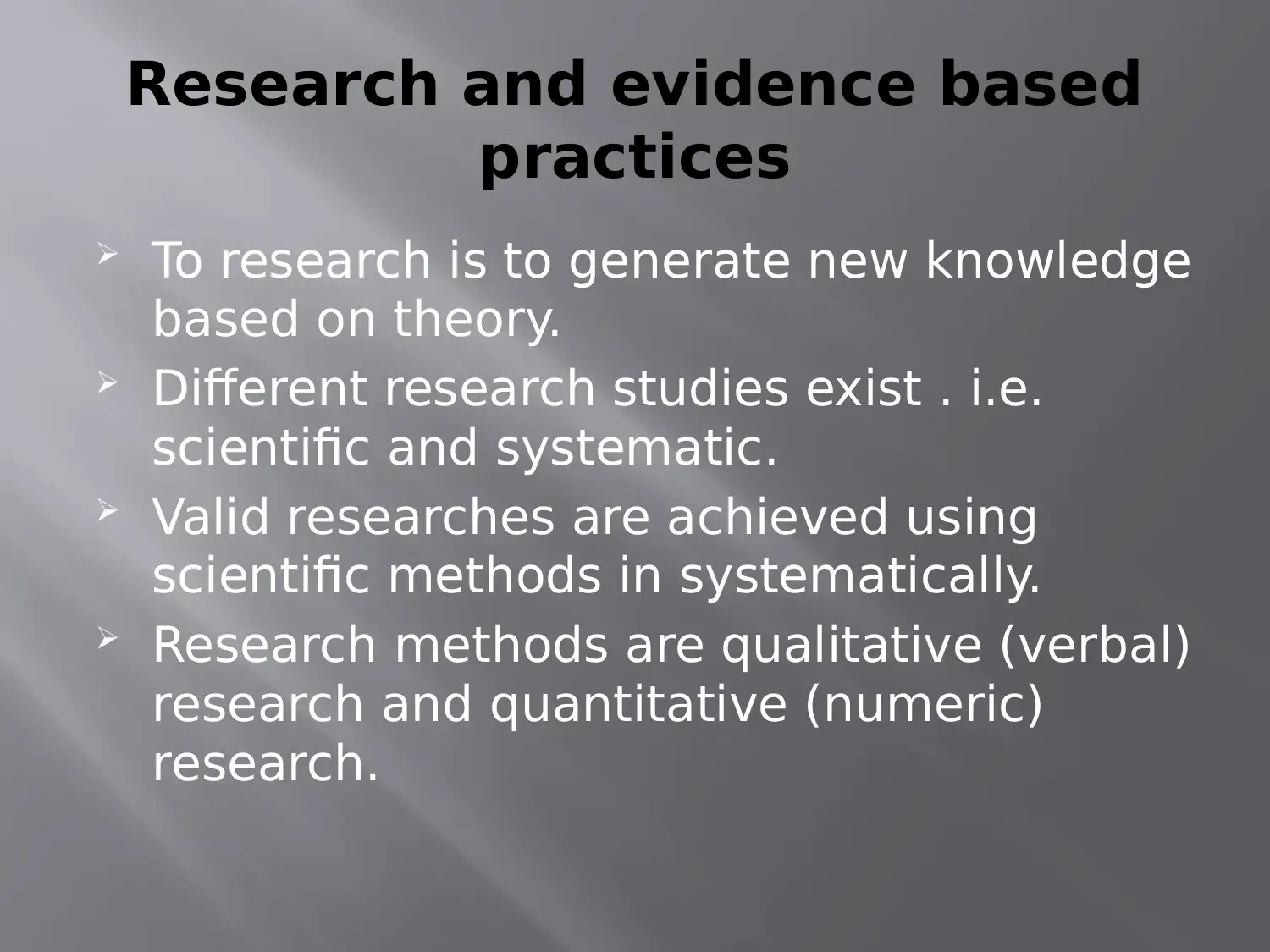
Research and evidence based
practices
To research is to generate new knowledge
based on theory.
Different research studies exist . i.e.
scientific and systematic.
Valid researches are achieved using
scientific methods in systematically.
Research methods are qualitative (verbal)
research and quantitative (numeric)
research.
practices
To research is to generate new knowledge
based on theory.
Different research studies exist . i.e.
scientific and systematic.
Valid researches are achieved using
scientific methods in systematically.
Research methods are qualitative (verbal)
research and quantitative (numeric)
research.
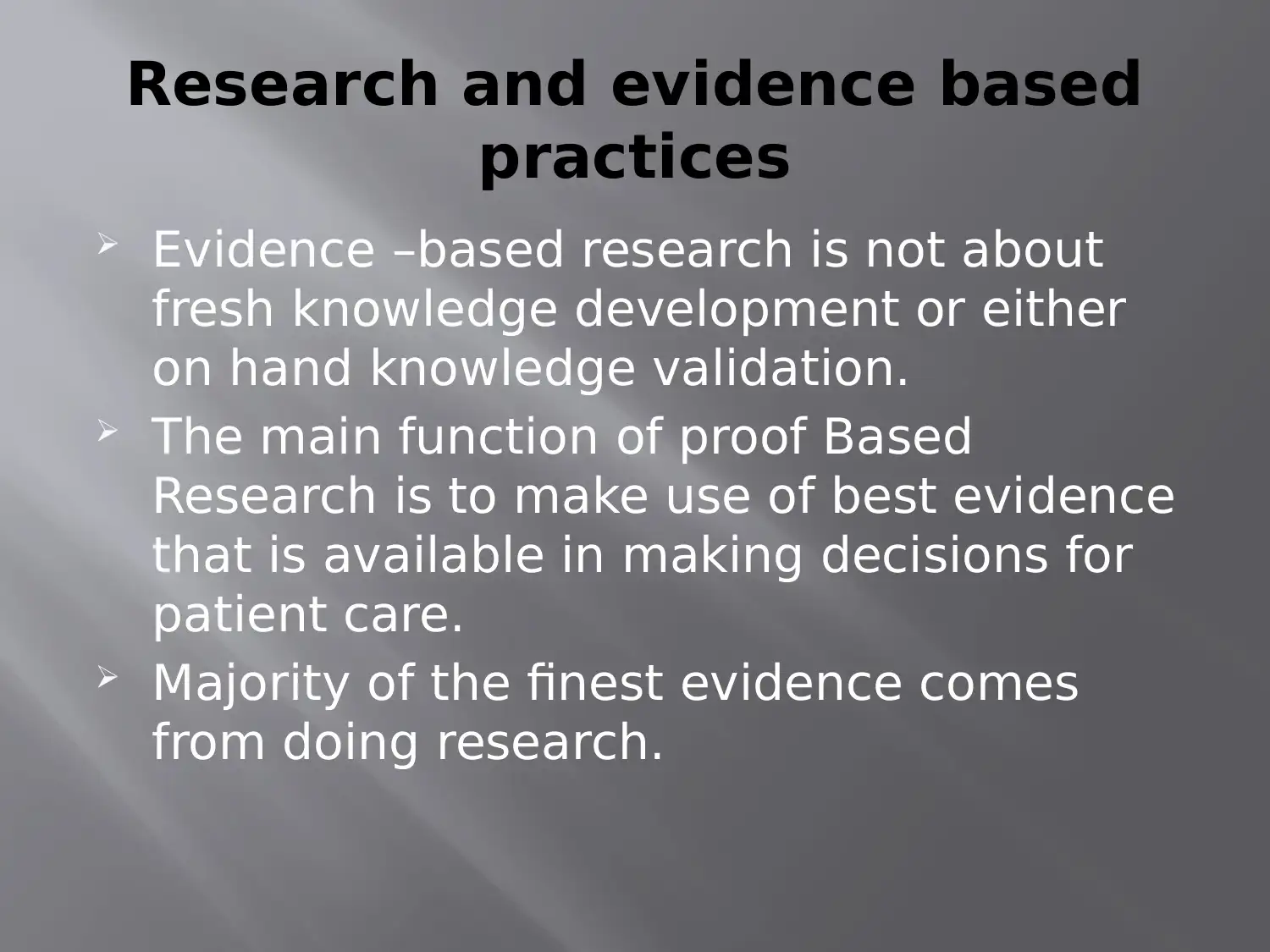
Research and evidence based
practices
Evidence –based research is not about
fresh knowledge development or either
on hand knowledge validation.
The main function of proof Based
Research is to make use of best evidence
that is available in making decisions for
patient care.
Majority of the finest evidence comes
from doing research.
practices
Evidence –based research is not about
fresh knowledge development or either
on hand knowledge validation.
The main function of proof Based
Research is to make use of best evidence
that is available in making decisions for
patient care.
Majority of the finest evidence comes
from doing research.
⊘ This is a preview!⊘
Do you want full access?
Subscribe today to unlock all pages.

Trusted by 1+ million students worldwide
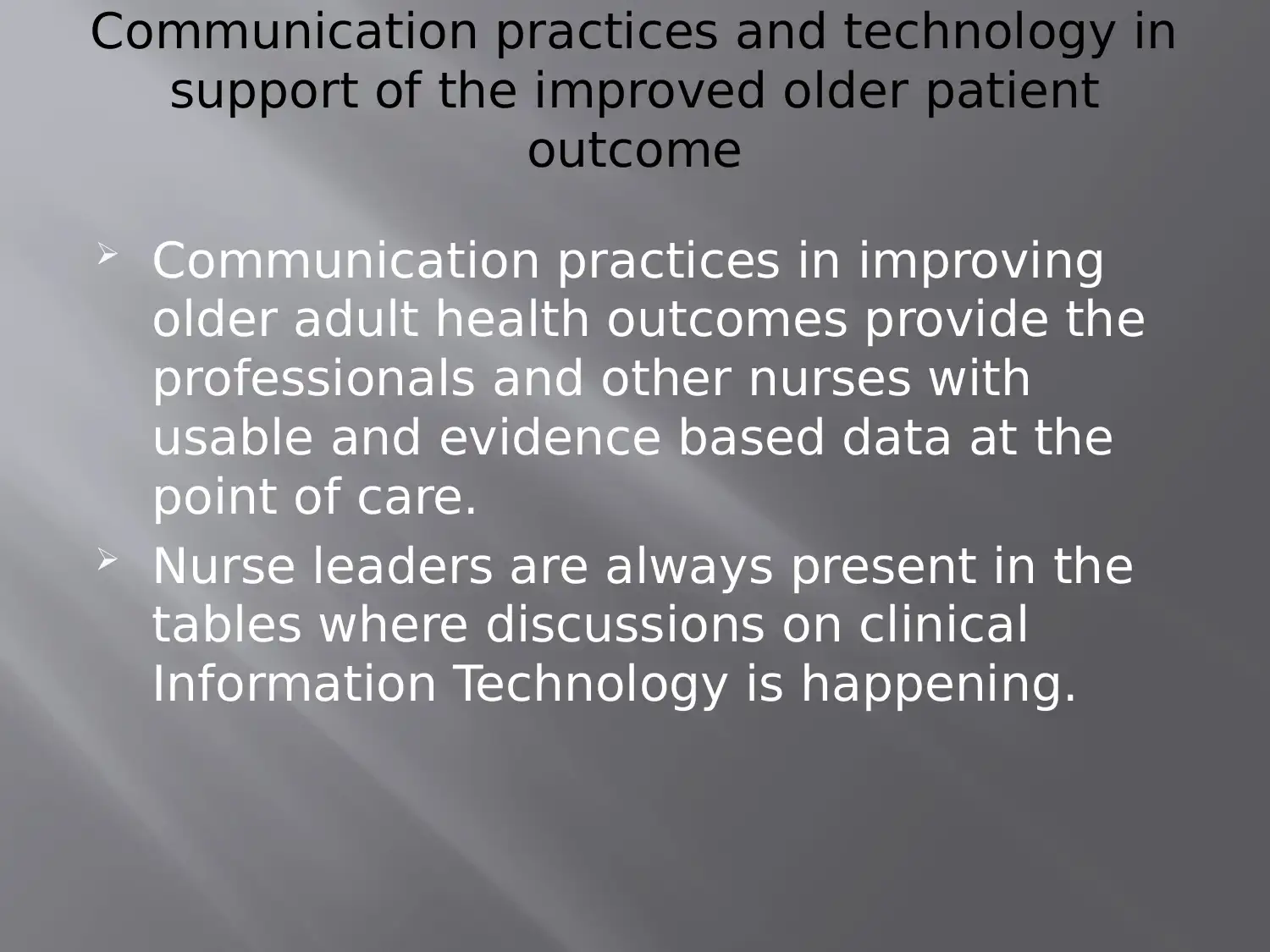
Communication practices and technology in
support of the improved older patient
outcome
Communication practices in improving
older adult health outcomes provide the
professionals and other nurses with
usable and evidence based data at the
point of care.
Nurse leaders are always present in the
tables where discussions on clinical
Information Technology is happening.
support of the improved older patient
outcome
Communication practices in improving
older adult health outcomes provide the
professionals and other nurses with
usable and evidence based data at the
point of care.
Nurse leaders are always present in the
tables where discussions on clinical
Information Technology is happening.
Paraphrase This Document
Need a fresh take? Get an instant paraphrase of this document with our AI Paraphraser
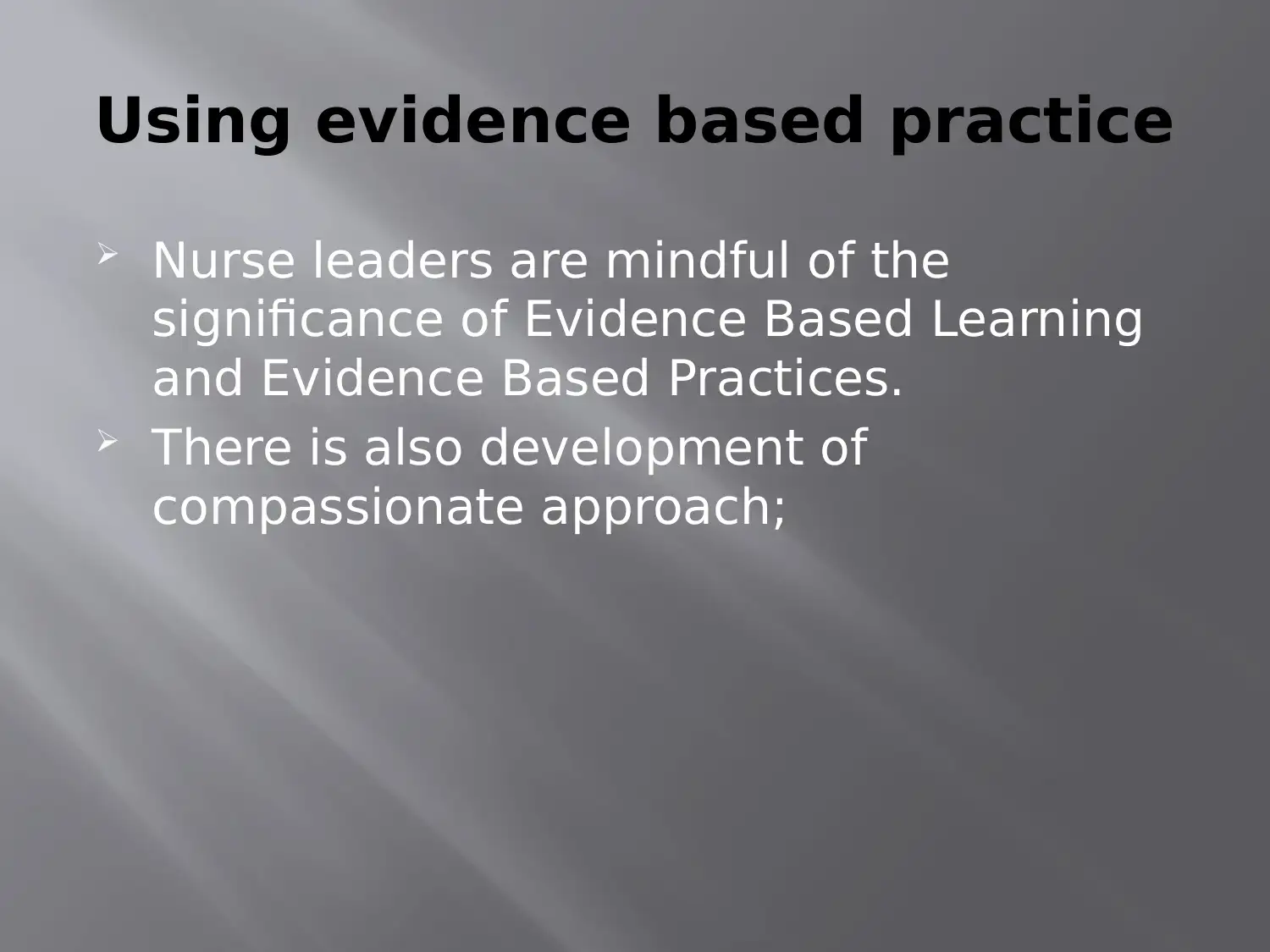
Using evidence based practice
Nurse leaders are mindful of the
significance of Evidence Based Learning
and Evidence Based Practices.
There is also development of
compassionate approach;
Nurse leaders are mindful of the
significance of Evidence Based Learning
and Evidence Based Practices.
There is also development of
compassionate approach;
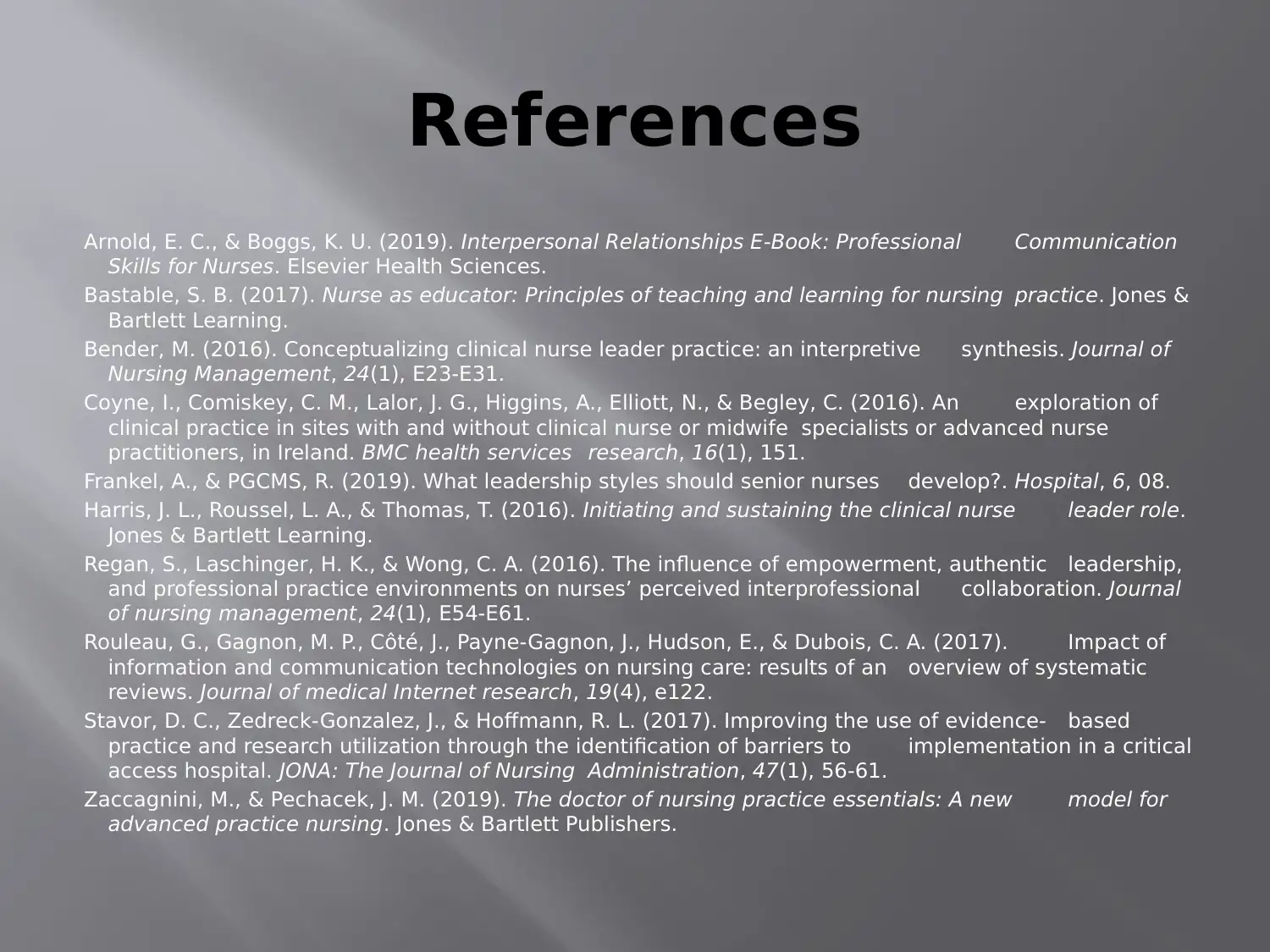
References
Arnold, E. C., & Boggs, K. U. (2019). Interpersonal Relationships E-Book: Professional Communication
Skills for Nurses. Elsevier Health Sciences.
Bastable, S. B. (2017). Nurse as educator: Principles of teaching and learning for nursing practice. Jones &
Bartlett Learning.
Bender, M. (2016). Conceptualizing clinical nurse leader practice: an interpretive synthesis. Journal of
Nursing Management, 24(1), E23-E31.
Coyne, I., Comiskey, C. M., Lalor, J. G., Higgins, A., Elliott, N., & Begley, C. (2016). An exploration of
clinical practice in sites with and without clinical nurse or midwife specialists or advanced nurse
practitioners, in Ireland. BMC health services research, 16(1), 151.
Frankel, A., & PGCMS, R. (2019). What leadership styles should senior nurses develop?. Hospital, 6, 08.
Harris, J. L., Roussel, L. A., & Thomas, T. (2016). Initiating and sustaining the clinical nurse leader role.
Jones & Bartlett Learning.
Regan, S., Laschinger, H. K., & Wong, C. A. (2016). The influence of empowerment, authentic leadership,
and professional practice environments on nurses’ perceived interprofessional collaboration. Journal
of nursing management, 24(1), E54-E61.
Rouleau, G., Gagnon, M. P., Côté, J., Payne-Gagnon, J., Hudson, E., & Dubois, C. A. (2017). Impact of
information and communication technologies on nursing care: results of an overview of systematic
reviews. Journal of medical Internet research, 19(4), e122.
Stavor, D. C., Zedreck-Gonzalez, J., & Hoffmann, R. L. (2017). Improving the use of evidence- based
practice and research utilization through the identification of barriers to implementation in a critical
access hospital. JONA: The Journal of Nursing Administration, 47(1), 56-61.
Zaccagnini, M., & Pechacek, J. M. (2019). The doctor of nursing practice essentials: A new model for
advanced practice nursing. Jones & Bartlett Publishers.
Arnold, E. C., & Boggs, K. U. (2019). Interpersonal Relationships E-Book: Professional Communication
Skills for Nurses. Elsevier Health Sciences.
Bastable, S. B. (2017). Nurse as educator: Principles of teaching and learning for nursing practice. Jones &
Bartlett Learning.
Bender, M. (2016). Conceptualizing clinical nurse leader practice: an interpretive synthesis. Journal of
Nursing Management, 24(1), E23-E31.
Coyne, I., Comiskey, C. M., Lalor, J. G., Higgins, A., Elliott, N., & Begley, C. (2016). An exploration of
clinical practice in sites with and without clinical nurse or midwife specialists or advanced nurse
practitioners, in Ireland. BMC health services research, 16(1), 151.
Frankel, A., & PGCMS, R. (2019). What leadership styles should senior nurses develop?. Hospital, 6, 08.
Harris, J. L., Roussel, L. A., & Thomas, T. (2016). Initiating and sustaining the clinical nurse leader role.
Jones & Bartlett Learning.
Regan, S., Laschinger, H. K., & Wong, C. A. (2016). The influence of empowerment, authentic leadership,
and professional practice environments on nurses’ perceived interprofessional collaboration. Journal
of nursing management, 24(1), E54-E61.
Rouleau, G., Gagnon, M. P., Côté, J., Payne-Gagnon, J., Hudson, E., & Dubois, C. A. (2017). Impact of
information and communication technologies on nursing care: results of an overview of systematic
reviews. Journal of medical Internet research, 19(4), e122.
Stavor, D. C., Zedreck-Gonzalez, J., & Hoffmann, R. L. (2017). Improving the use of evidence- based
practice and research utilization through the identification of barriers to implementation in a critical
access hospital. JONA: The Journal of Nursing Administration, 47(1), 56-61.
Zaccagnini, M., & Pechacek, J. M. (2019). The doctor of nursing practice essentials: A new model for
advanced practice nursing. Jones & Bartlett Publishers.
⊘ This is a preview!⊘
Do you want full access?
Subscribe today to unlock all pages.

Trusted by 1+ million students worldwide
1 out of 12
Related Documents
Your All-in-One AI-Powered Toolkit for Academic Success.
+13062052269
info@desklib.com
Available 24*7 on WhatsApp / Email
![[object Object]](/_next/static/media/star-bottom.7253800d.svg)
Unlock your academic potential
Copyright © 2020–2026 A2Z Services. All Rights Reserved. Developed and managed by ZUCOL.



